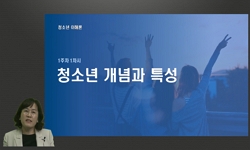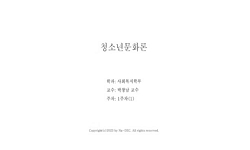This study aimed to investigate the relationship between subjective well-being and the frequency of sweetened beverage consumption in adolescents. The 19th Korea Youth Risk Behavior Web-Based Survey was used to analyze the general characteristics, soc...
http://chineseinput.net/에서 pinyin(병음)방식으로 중국어를 변환할 수 있습니다.
변환된 중국어를 복사하여 사용하시면 됩니다.
- 中文 을 입력하시려면 zhongwen을 입력하시고 space를누르시면됩니다.
- 北京 을 입력하시려면 beijing을 입력하시고 space를 누르시면 됩니다.
https://www.riss.kr/link?id=A109504849
- 저자
- 발행기관
- 학술지명
- 권호사항
-
발행연도
2024
-
작성언어
Korean
- 주제어
-
KDC
515
-
등재정보
KCI등재후보
-
자료형태
학술저널
-
수록면
114-123(10쪽)
- DOI식별코드
- 제공처
-
0
상세조회 -
0
다운로드
부가정보
다국어 초록 (Multilingual Abstract)
This study aimed to investigate the relationship between subjective well-being and the frequency of sweetened beverage consumption in adolescents. The 19th Korea Youth Risk Behavior Web-Based Survey was used to analyze the general characteristics, socio-demographic characteristics, oral health behavior, subjective well-being, and frequency of sweetened beverage consumption of middle and high school students. Subjective well-being was reclassified into low, medium, and high and analyzed. In order to identify the relationship between subjective well-being and frequency of sweetened beverage consumption, socio-demographic characteristics, oral health behavior, and frequency of fast food consumption of the study subjects were set as confounding variables and a complex sample logistic regression analysis was performed. The results showed that male students (62.1%) had higher subjective well-being than female students (53.2%), and middle school students (59.6%) had higher subjective well-being than high school students (55.9%). In addition, subjective well-being was higher in cases where parents had high education, subjective economic status, and subjective academic performance ( p<0.05). The group with average and low subjective well-being had a 1.224 and 1.272 times higher risk of consuming sweetened beverages more than 7 times a week than the group with high subjective well-being ( p<0.05). Excessive consumption of sweetened beverages can have negative effects on physical and mental health. Therefore, students’ sweetened beverages should be limited to an appropriate level, and related regulations and educational programs are necessary.
동일학술지(권/호) 다른 논문
-
COVID-19 팬데믹 이후 치위생학 교과의 치과감염관리 내용 분석 - 멸균 중심으로
- 대한치과의료관리학회
- 최지원(Ji-Won Choi)
- 2024
- KCI등재후보
-
- 대한치과의료관리학회
- 오상환(Sang-Hwan Oh)
- 2024
- KCI등재후보
-
치위생과 학생의 SNS 중독경향성과 자기통제력과의 관계
- 대한치과의료관리학회
- 최정희(Jeong-Hee Choi)
- 2024
- KCI등재후보
-
치위생과 학생의 임상실습 스트레스 반응과 인지적 유연성과의 관계
- 대한치과의료관리학회
- 황지민(Ji-Min Hwang)
- 2024
- KCI등재후보





 DBpia
DBpia




